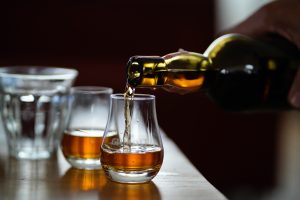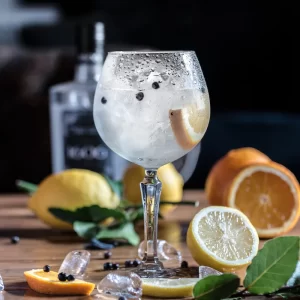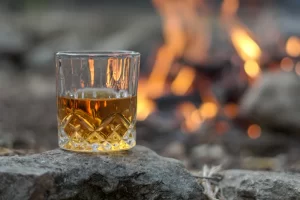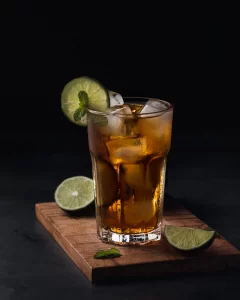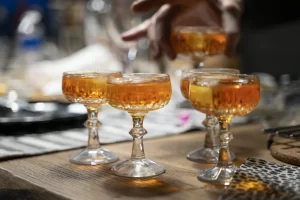Is Cognac Whiskey? What’s the Difference Between Cognac vs Whiskey?
Cognac and whiskey are both spirits; but, as we’ve seen previously on the Distillery Nearby blog, not all spirits are the same. Today, we’re going to answer the question: “is cognac whiskey?” What makes cognac and whiskey similar, and what makes them different? Join us today for our comparison of cognac vs whiskey. Let’s get started.
What Is Whiskey?
Whiskey is a distilled spirit that is known for its rich variety and complex flavors. It is made from fermented grain mash including barley, corn, rye, and wheat. This variety makes a wide range of whiskey types possible, each with its own flavor profile. There are multiple categories of whiskey, too: Scotch, Bourbon, and Irish whiskey.
Aging in wooden barrels contributes to a whiskey’s flavor profile and complexity. For example, longer aging periods often will give you deeper and more nuanced tastes. As you might have noticed, whiskey is more than just a drink; it’s a craft that people around the world love experiencing and creating. We’ll cover more as we get further into the blog. For now, let’s pause on the different types and cover them in detail for you.
The Three Types of Whiskey
Scotch Whisky
Scotch is made in Scotland and must age in oak barrels for at least three years. It’s known for its peaty flavor, especially in single malts from the Islay region. Scotch can be single malt, single grain, or a blend of these. Flavors range from smoky and rich to light and floral.
Bourbon Whiskey
Bourbon is a classic American spirit — it’s primarily made from corn (at least 51%), giving it a sweet and full-bodied profile. It is aged in new charred oak barrels, which gives the spirit interesting vanilla and caramel notes. Bourbon doesn’t have a minimum aging period, but to be called “straight” Bourbon, it has to be aged for at least two years.
Irish Whiskey
Irish whiskey is typically triple distilled and aged in wooden casks for a minimum of three years — this leads to a smoother, more straightforward tasting profile. It is made from a mix of malted and unmalted barley, and it offers a wide range of flavors. You could get creamy, fruity, spicy, and floral Irish whiskeys.
What Is Cognac?
Cognac is a type of brandy (wine spirit) that comes from the Cognac region in France; it has meticulous production standards and specific geographic origin. The spirit itself is made from Ugni Blanc, Folle Blanche, and Colombard white grape varieties. You won’t find cognac distilleries in the USA.
Cognac is rich, smooth, and has a complex flavor profile, which comes from the very careful aging process it undergoes. It’s held to really high standards, too — Cognac’s quality and authenticity are strictly regulated. This ensures that each bottle properly represents French craftsmanship and heritage it represents.
Standards for Cognac Production
As we mentioned above, Cognac is governed by very strict standards to ensure its quality. Here are the key standards and regulations:
Geographic Origin
Cognac must be produced in the Cognac region of France. This region is divided into six sub-regions or ‘crus’, each known for its soil characteristics and climate. The crus further influences the flavor of a bottle of Cognac.
Learn More: The 6 Crus of Cognac: Growth Area and Region | Cognac-Expert
Grape Varieties
Cognac is primarily made from Ugni Blanc, but Folle Blanche and Colombard grapes and a few other lesser-known varieties are allowed, too. Ugni Blanc is definitely preferred due to its high acidity — this makes it great for Cognac production.
Distillation
Cognac must be distilled two times in traditional copper pot stills. This process concentrates the flavors and alcohol, leading to a more complex end-product.
Aging
After distillation, Cognac must be aged in French oak barrels for at least two years. However, many producers age their Cognac for much longer to develop the spirit further. The aging process is important for developing the spirit’s unique color and flavor profile.
ABV (Alcohol By Volume)
The final product must have an ABV of at least 40%. This standard ensures consistent quality across all Cognac brands.
Blending
Cognac is often a blend of eaux-de-vie (the distilled spirits) from different years and sometimes different crus. Master blenders combine various eaux-de-vie to achieve their house style or to create unique bottlings. The blending process is key to Cognac’s complexity and depth of flavor.
Labeling Categories
Cognac is categorized based on the age of the youngest eau-de-vie in the blend. Common labels include:
- VS: Very Special, aged at least 2 years
- VSOP: Very Superior Old Pale, aged at least 4 years
- XO: Extra Old, aged at least 10 years
So, Is Cognac Whiskey?
As you can see from just this short comparison so far, cognac and whiskey are not the same spirit. In fact, they are incredibly different! Let’s learn more…
Production Processes: Whiskey vs Cognac
Whiskey
The whiskey-making process begins with malting, where grains (barley, corn, rye, or wheat) are soaked, germinated, and dried to convert starches into fermentable sugars. The malt is then mashed and mixed with water, creating a wort. Yeast is added to the wort to ferment it into a low-alcohol wash.
This wash is distilled, often twice, to increase alcohol content and refine flavors. The distilled spirit, now called “new make spirit,” is aged in wooden barrels. The type of wood, the barrel’s history (new or used; bourbon, sherry, etc.), and the aging duration greatly influence the whiskey’s final flavor, color, and aroma. Each whiskey type has specific requirements for these steps, contributing to the diverse profiles of Scotch, Bourbon, and Irish whiskey.
Cognac
Cognac production starts with the fermentation of white grapes, predominantly Ugni Blanc. The resulting wine is low in alcohol and high in acidity, ideal for distillation. Cognac undergoes a double distillation process in traditional copper pot stills, a step that concentrates the wine’s flavors and aromas into a clear eau-de-vie.
The eau-de-vie is then aged in French oak barrels, with a minimum of two years required by law. This aging process is crucial for developing Cognac’s complexity, character, and signature smoothness. Master blenders may mix various ages and qualities of eau-de-vie to achieve the desired final product, showcasing the artistry behind Cognac making.
Taste of Cognac vs Whiskey
As you can imagine, whiskey and cognac really don’t taste similar. They’re made from different starting products. Though both double-distilled, this one factor has a huge impact on the final flavor. Let’s take a look at a quick and dirty comparison of the flavors offered by each spirit.
Note: Please keep in mind that these are generalizations of each category. Specific bottles will have their own unique tasting notes.
- Irish Whiskey: floral, green apple, vanilla, smooth grain
- Bourbon Whiskey: vanilla, caramel, oakiness, toasted nuts
- Scotch Whiskey: peat smoke, sea salt, dried fruit, malt
- Young Cognac: fresh grapes, floral, pear, light spice
- Mature Cognac: dried fruit, toasted almond, cinnamon, chocolate
- Older Cognac: leather, tobacco, dark chocolate, oakiness
Cultural Significance of Whiskey vs Cognac
As you could expect, these spirits each have very different cultural backgrounds. Let’s take a look:
Whiskey’s Cultural Background
Whiskey can be traced all the way back to Scotland and Ireland several centuries ago. It, like many other spirits, began as a medicinal “elixir,” eventually becoming a staple of cultural identity. In Scotland, whiskey (or “Scotch”) isn’t just a drink — it’s an emblem of Scottish heritage and it’s celebrated with traditions like the Burns Supper.
In the United States, bourbon has shaped regions like Kentucky, turning into an American symbol!
Cognac’s Cultural Background
Cognac’s history is deeply joined with the French art de vivre, representing sophistication. It was developed in the 16th century, and it began a global journey when France began shipping it as an export.
Centuries-old Cognac houses further speak to the spirit’s cultural importance. In fact, cognac is discussed in literature, music, and film. This simple spirit has evolved so far that it’s become a staple of fine dining.
Cognac vs Whiskey: Price and Accessibility
When it comes to price and accessibility, there’s a wide range of options for both spirits. However, we’ll try to provide you with a general overview on price and the accessibility of these two spirits.
Whiskey
The price of whiskey varies widely depending on the type, age, brand, and region of production. Entry-level bottles of bourbon or Irish whiskey start around $20-$30, making them pretty affordable.
Scotch whisky (particularly single malts from renowned distilleries) can quickly escalate in price. Premium bottles can cost hundreds or even thousands of dollars. Whiskey is widely available in most countries, and there’s a fantastic selection in liquor stores, supermarkets, and online retailers.
Cognac
Cognac tends to start at a slightly higher price point, with entry-level VS (Very Special) bottles typically priced around $30-$50.
Prices for VSOP (Very Superior Old Pale) and XO (Extra Old) cognacs significantly increase, often reaching into the hundreds or more. Very rare or limited-edition bottles will run you into the thousands.
Since genuine cognac is highly protected and exclusively produced in the Cognac region of France, this can affect its price and accessibility. However, you can usually find some in specialty liquor stores and online platforms, especially in urban centers and regions with a strong culture of spirit consumption.
In general, both whiskey and cognac can fit any budget.
Choosing Between Whiskey and Cognac
Choosing between whiskey and cognac mainly boils down to personal taste and the occasion.
Whiskey has a broad flavor range that you’ll find options for both casual and formal settings. It’s great in cocktails, neat, or on the rocks.
Cognac is more suited for celebrations and parties. It’s best for after-dinner sipping or special occasions.
Your preference could also be influenced by the season or what you’re eating. Whiskey pairs well with a variety of foods, including meats and desserts. Cognac goes well with cheese, nuts, and fruit desserts.
In the end, it’s really about what you enjoy most.
Cognac vs Whiskey FAQs
Have more questions still? Check out these commonly asked questions about the two spirits we’ve covered:
Cognac vs Whiskey Glass: How Are They Different?
Glasses for cognac are typically wider with a narrower top to enhance aroma, while whiskey glasses are often straight-sided or tapered for nosing and tasting.
Cognac vs Whiskey Alcohol Content: Is There a Difference?
Both Cognac and whiskey must have a minimum alcohol content of 40% ABV. However, the ABV or proof will certainly vary from brand to brand and bottle to bottle.
Is Cognac a Brandy or Whiskey?
Cognac is a type of brandy, not whiskey, made from distilled white wine in the Cognac region of France. This is the main reason for the difference in flavor you’ll experience while drinking them.
Is Cognac Better Than Whiskey?
Whether Cognac is better than whiskey depends on personal taste preference, of course. However, it’s important to keep in mind that there are three different types of whiskey, too. There is polarizing opinion on taste profile, even within the greater whiskey community.
Should Cognac Taste Like Whiskey?
Cognac and whiskey have distinct taste profiles, due to their differing starting ingredients; Cognac should not taste like whiskey. You may find specific bottles of whiskey that were aged in wine, brandy, or cognac barrels that may impart a “wine flavor” to the whiskey, but they will still be incredibly different.
Can You Mix Cognac and Whiskey?
Yes, you can mix Cognac and whiskey, though it’s not traditional and depends on personal preference. In fact, there’s a cocktail that uses both these spirits, called the “Vieux Carré.” It’s a classic cocktail originating from New Orleans. This cocktail is a mix of Cognac, rye whiskey, sweet vermouth, Bénédictine, and a dash each of Peychaud’s and Angostura bitters.
Is Crown Royal a Whiskey or Cognac?
Crown Royal is a Canadian whiskey, not a Cognac.
Is Hennessy Cognac or Whiskey?
Hennessy is a Cognac, not a whiskey.
Find Delicious Whiskeys and Cognacs at Distillery Nearby Today!
Here at Distillery Nearby, we’re passionate about spirits like whiskey and cognac! Here, you can learn more about each spirit, how they’re made, and how you can get your hands on bottles of them. While you can’t necessarily visit a cognac distillery in the USA, you can visit a variety of whiskey and bourbon distilleries here! It can be hard to find them all in one place, though.
That’s why we created Distillery Nearby! Our online directory is your one-stop shop for learning more about spirits and finding new distilleries to visit and enjoy.
